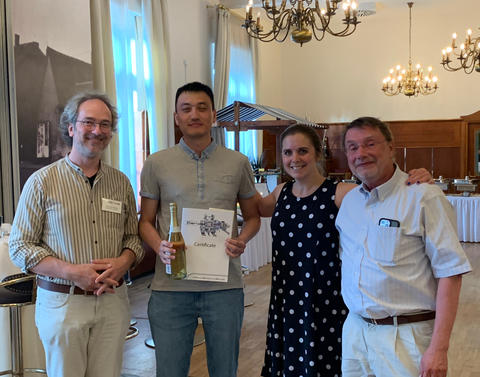 Dr. Bai-Long Hoid has received the Panda Theory PhD Prize 2022 for his doctoral thesis "Taming Hadronic Effects at the Precision Frontier: From the Muon Anomaly to Rare Decays".
Dr. Bai-Long Hoid has received the Panda Theory PhD Prize 2022 for his doctoral thesis "Taming Hadronic Effects at the Precision Frontier: From the Muon Anomaly to Rare Decays".
His doctoral advisor was PD Dr. Bastian Kubis from the University of Bonn. The award was announced at the most recent Panda Collaboration meeting at GSI, Darmstadt and handed over to Dr. Bai-Long Hoid (with certificate) by the spokesperson of the Panda Collaboration, Prof Ulrich Wiedner (right), Univeristy Bochum, Germany, deputy spokesperson Prof Karin Schönning (2nd right), University Uppsala, Sweden and chair of the Theory Adisory Group Prof Christian Fischer (left), University Giessen, Germany, during a dinner ceremony.
The Panda Collaboration has awarded the Theory PhD Prize for the third time to honor the best theory dissertation written in connection with the Panda Experiment.
In his work Dr. Bai-Long Hoid studied the dominating theoretical uncertainties regarding the prediction of the muon anomalous moment, which come from hadronic vacuum polarization and hadronic light-by-light scattering. Currently there is a 5$\sigma$ discrepancy between experimental measurements and theoretical predictions. Dr. Bai-Long Hoid successfully addressed a very complex problem and also significantly advanced the theoretical tools that are required to carry out high precision calculations for the relevant hadronic quantities in this low energy regime. His scientific publications have received high recognition in the community and beyond.
The Panda Collaboration awards PhD Prizes to specifically honor students’ contributions related to the Panda project. Candidates for the PhD Prize are nominated by their doctoral advisors. In addition to being directly related to the Panda Experiment, the nominees’ doctoral degrees must have received a rating of “very good” or better. Up to three candidates are shortlisted for the award and can present their dissertations at the Panda Collaboration meeting. The winner is chosen by a committee that is appointed for this task by the Panda Collaboration.
(Photo: James Ritman, GSI)




